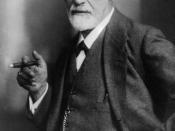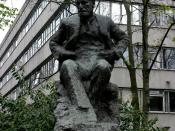The Discovery of the Unconscious
The person popularly attributed with the discovery of the unconscious is of course Sigmund Freud. It's exploration however dates back to the beginnings of philosophy and indeed to conscious thought itself. The question of who discovered the unconscious is really based on who systematically explored this idea of a 'second mind' and really began to consign our emotions and actions to its workings. The major difficulty with the discovery of the unconscious is that without an ascribed name we would not be able to categorize all the things we believe to be it's workings. If we were asked who named the unconscious it would undoubtedly be Freud but this does not alter the fact that many writers and thinkers have explored the all the different facets of our unconscious minds without ever physically investigating it. An example of this is in Dostoyevsky's great psychological novel 'Crime and Punishment'.
In the novel the student murderer Raskolnikov's fraught condition is described as 'hypochondria' by the doctor who recognizes it as a mental disease, where as we would now more likely call it an 'anxiety neuroses' due to Freud's naming of the condition. Does the fact it has a name different from our own make it an altogether unique discovery?
It is better though to go back to the beginning, as the ideas imbued in us by the writers of philosophers and existentialists are the real basis of psychoanalysis and the discovery of the unconscious. Plato described our lives as that of looking at the dancing shadows in a darkened cave, never seeing the source of the actions, and only seeing the diluted and disjointed consequences. This is essentially a description of the workings of our unconscious mind. Indeed Freud himself constantly refers to philosopher throughout his...


